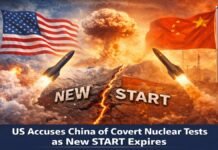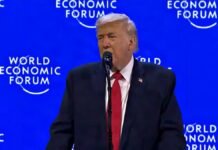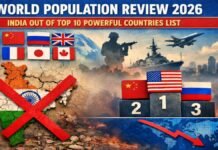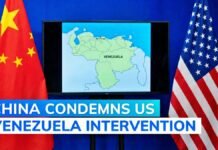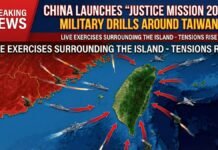
Key Highlights:
- “Tremendous Tariff-Makers”: US President Donald Trump singles out China, India, and Brazil for imposing high tariffs and vows to retaliate with aggressive trade measures.
- America First Agenda: Trump reiterates his commitment to putting “America First”, emphasizing plans to protect US industries and citizens by imposing tariffs on nations that “harm” the United States.
- Contentious Trade Policy: Trump labels India, one of the US’ largest trading partners, as a “very big abuser”, intensifying tensions between the two nations despite recent diplomatic engagements.
- Encouraging Domestic Manufacturing: Trump urges foreign companies, including those from India, China, and Brazil, to “build your plant right here in America” to avoid steep tariffs.
- Uncertain Diplomatic Agenda: Trump’s comments come shortly after a telephonic conversation with Indian PM Narendra Modi, during which tariffs were not explicitly discussed, raising questions about their future trade negotiations.
Washington, D.C./Florida: US President Donald Trump, speaking at a House Republicans retreat in Florida on Tuesday, launched a scathing critique of China, India, and Brazil, describing them as “tremendous tariff-makers” who have taken advantage of the United States for years.
In his address, Trump pledged to take decisive action by imposing tariffs on foreign nations that harm the US economy, reasserting his commitment to his “America First” policy. “We’re not going to allow this anymore,” he declared, underlining his administration’s intention to defend American interests aggressively.
Targeting Major Players: India, Brazil, and China in the Crosshairs
Trump specifically pointed out India and Brazil, two key members of the influential BRICS bloc, alongside China. His remarks come at a time when these nations are growing their global influence through trade, often employing protectionist measures to safeguard domestic industries.
- Trump on Tariffs:
“China is a tremendous tariff-maker, and India, Brazil, and so many other countries… But we’re not going to let that happen any longer. We’re going to put America first,” he asserted. - Fair Trade Vision:
Trump outlined his vision of a “very fair system,” claiming, “We will tariff and tax foreign countries to enrich our citizens. Instead of taxing our citizens to help other countries, we will prioritize American workers and industries.”
Tensions with India: A Longstanding Trade Dispute
Trump’s remarks about India have reignited tensions between the two strategic allies. Despite being one of the US’ largest trading partners, India has faced criticism from Trump, who accused New Delhi during his presidential campaign of being a “very big abuser” of trade agreements.
Interestingly, these comments come just a day after Indian Prime Minister Narendra Modi held a telephonic conversation with Trump, emphasizing mutual efforts toward global peace and stability. While the high-level engagement was described as positive by officials on both sides, it remains unclear whether contentious trade issues, including tariffs, were discussed.
Trade relations between the US and India have seen friction over the years, particularly regarding agricultural products, technology transfers, and high import duties on American goods.
Trump’s Warning to Foreign Companies: “Build in America or Face Tariffs”
In addition to criticizing foreign nations for their trade practices, Trump extended a warning to international companies. He proposed a simple solution to avoid the impending tariff hikes:
“If you’re a company in India, China, or Brazil, and you want to avoid these tariffs, build your plant right here in America.”
Trump’s remarks underscore his administration’s push to boost domestic manufacturing, a central pillar of his economic strategy. By encouraging foreign companies to localize production, Trump aims to create jobs, reduce trade deficits, and strengthen the US industrial base.
Trade Policy in Context: Echoing Past Promises
Trump’s latest comments align closely with the protectionist rhetoric he championed during his 2024 re-election campaign and after being sworn in last week. Reiterating his commitment to “riches and power” for the United States, Trump declared, “We will very quickly make the US richer and more powerful.”
This comes at a time when global trade dynamics are shifting, with BRICS nations (Brazil, Russia, India, China, South Africa) carving out a greater role in international trade and cooperation.
The Larger Picture: US-China-India Relations Under Scrutiny
Trump’s targeting of India, Brazil, and China comes amid simmering tensions in global geopolitics and trade:
- China’s Dominance:
China, often referred to as a trade superpower, has consistently been Trump’s primary target for tariff impositions due to its significant trade surplus with the US and aggressive market strategies. - India’s Balancing Act:
While India has sought to maintain strong ties with both the US and its BRICS allies, Trump’s criticisms of India’s protectionist tariffs could complicate diplomatic and trade relations further. - Brazil’s Role:
As one of South America’s leading economies and a key BRICS member, Brazil’s inclusion in Trump’s speech highlights the growing influence of emerging economies in challenging US trade power.
Expert Opinions on Trump’s Tariff Strategy
Trade analysts suggest that Trump’s emphasis on imposing tariffs may face significant domestic and international pushback, as tariffs often lead to higher consumer costs and retaliatory trade measures. However, his unwavering stance on “America First” policies signals a broader effort to reshape global trade dynamics in favor of US interests.
Dr. Martin Hayes, an economist at Global Trade Institute, commented, “While Trump’s rhetoric appeals to his domestic audience, such bold moves could risk alienating major trade allies like India and Brazil, potentially leading to long-term economic consequences.”
A Hardened Trade Stance with Global Implications
President Donald Trump’s fiery rhetoric against China, India, and Brazil underscores a sharper focus on revamping US trade policies to align with his America First agenda. His call for imposing tariffs on “tremendous tariff-makers” reflects a strategic shift to protect American industries while boosting domestic manufacturing.
However, with trade partners like India engaging diplomatically and the BRICS bloc growing in stature, Trump’s protectionist policies could lead to heightened geopolitical and economic tensions. Whether these tariffs materialize or remain largely political posturing, one thing is clear: Trump’s vision for a “fairer” trade system is poised to reshape global trade relations in 2025 and beyond.





































